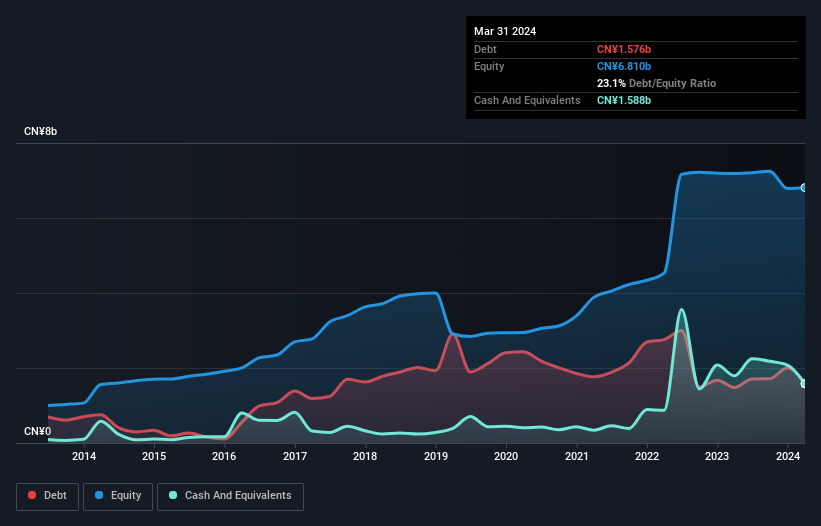Stock Analysis
These 4 Measures Indicate That Jiangsu Azure (SZSE:002245) Is Using Debt Reasonably Well

Howard Marks put it nicely when he said that, rather than worrying about share price volatility, 'The possibility of permanent loss is the risk I worry about... and every practical investor I know worries about.' When we think about how risky a company is, we always like to look at its use of debt, since debt overload can lead to ruin. We can see that Jiangsu Azure Corporation (SZSE:002245) does use debt in its business. But should shareholders be worried about its use of debt?
When Is Debt A Problem?
Generally speaking, debt only becomes a real problem when a company can't easily pay it off, either by raising capital or with its own cash flow. In the worst case scenario, a company can go bankrupt if it cannot pay its creditors. However, a more usual (but still expensive) situation is where a company must dilute shareholders at a cheap share price simply to get debt under control. Of course, debt can be an important tool in businesses, particularly capital heavy businesses. The first thing to do when considering how much debt a business uses is to look at its cash and debt together.
View our latest analysis for Jiangsu Azure
What Is Jiangsu Azure's Debt?
As you can see below, at the end of March 2024, Jiangsu Azure had CN¥1.58b of debt, up from CN¥1.48b a year ago. Click the image for more detail. But on the other hand it also has CN¥1.59b in cash, leading to a CN¥11.6m net cash position.

How Strong Is Jiangsu Azure's Balance Sheet?
According to the last reported balance sheet, Jiangsu Azure had liabilities of CN¥3.20b due within 12 months, and liabilities of CN¥548.2m due beyond 12 months. Offsetting these obligations, it had cash of CN¥1.59b as well as receivables valued at CN¥1.83b due within 12 months. So it has liabilities totalling CN¥327.4m more than its cash and near-term receivables, combined.
Of course, Jiangsu Azure has a market capitalization of CN¥8.77b, so these liabilities are probably manageable. Having said that, it's clear that we should continue to monitor its balance sheet, lest it change for the worse. While it does have liabilities worth noting, Jiangsu Azure also has more cash than debt, so we're pretty confident it can manage its debt safely.
Even more impressive was the fact that Jiangsu Azure grew its EBIT by 244% over twelve months. If maintained that growth will make the debt even more manageable in the years ahead. The balance sheet is clearly the area to focus on when you are analysing debt. But ultimately the future profitability of the business will decide if Jiangsu Azure can strengthen its balance sheet over time. So if you want to see what the professionals think, you might find this free report on analyst profit forecasts to be interesting.
Finally, while the tax-man may adore accounting profits, lenders only accept cold hard cash. While Jiangsu Azure has net cash on its balance sheet, it's still worth taking a look at its ability to convert earnings before interest and tax (EBIT) to free cash flow, to help us understand how quickly it is building (or eroding) that cash balance. During the last three years, Jiangsu Azure burned a lot of cash. While that may be a result of expenditure for growth, it does make the debt far more risky.
Summing Up
We could understand if investors are concerned about Jiangsu Azure's liabilities, but we can be reassured by the fact it has has net cash of CN¥11.6m. And it impressed us with its EBIT growth of 244% over the last year. So we don't have any problem with Jiangsu Azure's use of debt. Over time, share prices tend to follow earnings per share, so if you're interested in Jiangsu Azure, you may well want to click here to check an interactive graph of its earnings per share history.
If you're interested in investing in businesses that can grow profits without the burden of debt, then check out this free list of growing businesses that have net cash on the balance sheet.
New: Manage All Your Stock Portfolios in One Place
We've created the ultimate portfolio companion for stock investors, and it's free.
• Connect an unlimited number of Portfolios and see your total in one currency
• Be alerted to new Warning Signs or Risks via email or mobile
• Track the Fair Value of your stocks
Have feedback on this article? Concerned about the content? Get in touch with us directly. Alternatively, email editorial-team (at) simplywallst.com.
This article by Simply Wall St is general in nature. We provide commentary based on historical data and analyst forecasts only using an unbiased methodology and our articles are not intended to be financial advice. It does not constitute a recommendation to buy or sell any stock, and does not take account of your objectives, or your financial situation. We aim to bring you long-term focused analysis driven by fundamental data. Note that our analysis may not factor in the latest price-sensitive company announcements or qualitative material. Simply Wall St has no position in any stocks mentioned.
Have feedback on this article? Concerned about the content? Get in touch with us directly. Alternatively, email editorial-team@simplywallst.com
About SZSE:002245
Jiangsu Azure
Engages in lithium batteries, LED chips, and metal logistics and distribution businesses in China and internationally.

